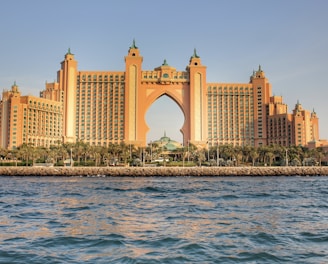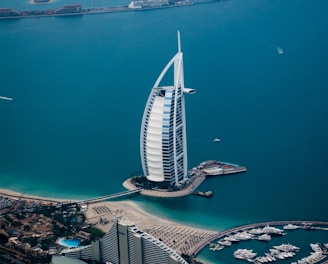YOUR PARTNER FOR STARTUP, SME, AND INDUSTRIAL BUSINESS SETUP IN THE REGION'S PREMIER ECONOMIC ZONE
Process of Dubai Business Setup in Free Zone
1. Determine the Legal Structure
Choose between legal entities like FZE (single shareholder), FZ LLC (multiple shareholders), or Branch Office, based on ownership structure and liability preferences.
2. Choose Business Activity
Select from the free zone’s approved activities list, ensuring alignment with your core operations (e.g., trading, consulting, or industrial services).
3. Select Office Space Type
Opt for a virtual office (flexi-desk) for cost efficiency or a physical office for dedicated workspace, depending on operational needs.
4. Obtain Pre-Approvals
Secure mandatory approvals from relevant authorities (e.g., health, education, or financial regulators) before or after license issuance, depending on the activity.
5. Apply for Business License
Submit required documents (passport copies, NOC, etc.) and select a license type (commercial, industrial, or professional) matching your activity.
6. License Issuance
Receive your license alongside a virtual lease agreement (for flexi-desks) or physical office lease agreement upon final approval.


Process of Business Setup in Dubai Mainland
1. Trade Name Registration
Begin by registering a unique trade name with the emirate’s Department of Economic Development (DED). The name must adhere to guidelines, such as including a legal suffix (e.g., “LLC”), avoiding religious or government-related terms, and ensuring originality. Names cannot solely use surnames or country names without embassy consent.
2. Pre-Approval
Obtain initial approval from the DED to confirm no governmental objections to the business. Certain sectors (e.g., healthcare, education) may require additional pre-approvals from specialized authorities before proceeding.
3. MOA Preparation
Draft a Memorandum of Association (MOA) with local legal experts or notary publics. This document outlines the company’s structure and operations, particularly mandatory for entities like LLCs.
4. Rental Agreement Issuance
Secure a commercial lease contract registered with the emirate’s land department. Submit this agreement to the DED as part of the licensing requirements.
5. External Approvals
Acquire sector-specific approvals from relevant authorities (e.g., Ministry of Justice for legal firms). These may be needed pre- or post-license issuance, depending on the activity.
6. Business License Issuance
Submit final documents given below to the DED.
Trade name certificate
Pre-approval receipt
MOA
Registered lease agreement
External approvals (if applicable)
The DED issues the mainland license after verifying all submissions.


Process of Offshore Business Setup in Dubai
1. Submit Documents to Registered Agent
Provide required documents (passport copies, proof of address, etc.) to your registered agent for initial processing.
2. Business Name Approval
The agent secures approval for your proposed company name from Dubai authorities.
3. Due Diligence Check
The agent conducts KYC (Know Your Customer) verification using submitted documents to ensure compliance.
4. Prepare Application Documents
Draft and finalize the following for client review and signature:
Appointment letter for the registered agent
Consent letters from directors/secretary
Specimen signatures
Memorandum of Association (MoA) and Articles of Association (AoA)
5. Application Submission
The agent submits the signed documents to relevant authorities.
6. Company Registration
Authorities review and formally register the offshore entity.
7. Document Issuance
Receive incorporation documents as given below.
Certificate of Incorporation
Company registers
Memorandum of Association (MoA)


Frequently asked questions
WHAT IS A FREE ZONE COMPANY IN THE UAE?
A free zone in the UAE, is an economic area with its own business regulations that do not apply to businesses outside the zone. Free zone companies trade services and products, while leveraging special tax and foreign ownership laws. A free zone company in the UAE, such as those facilitated by RAK, is an entity that enjoys numerous advantages, including tax exemptions, full foreign ownership and simplified business regulations within designated RAK economic zones.
HOW CAN A FREE ZONE BUSINESS OWNER GET A VISA IN THE UAE?
Acquiring a visa in the UAE for a free zone business, particularly through entities, involves initiating the company set-up process within the designated free trade zone in the UAE. This includes submitting necessary documentation, meeting specific criteria and complying with the regulations set.
WHAT ARE THE BENEFITS OF SETTING UP A BUSINESS IN A FREE ZONE IN THE UAE?
Setting up a business in a UAE business zone, such as the Ras Al Khaimah Economic Zone, comes with benefits. Some notable advantages include:
Free capital transfer: Businesses operating within free zones in the UAE benefit from the freedom to transfer capital without encountering restrictions or impediments.
100% ownership of fixed assets: Companies operating within the free zones enjoy the privilege of complete ownership rights over their fixed assets, contributing to greater autonomy and control over their operations.
Up to 100% foreign ownership: Foreign investors are granted the opportunity to possess full ownership in these designated zones, fostering an environment conducive to international investment and collaboration.
Up to 100% of profit return: RAK Economic Zone allows for the repatriation of up to 100% of profits, providing an attractive incentive for businesses to operate within these regions and stimulate economic growth.
Strong banking system: Supported by robust government backing, the UAE boasts a resilient banking system, instilling confidence among investors and facilitating smooth financial transactions.
No transfer restrictions: Businesses encounter no restrictions on the transfer of funds within the free zones, enabling seamless financial transactions and enhancing operational efficiency.
Fully-convertible currency: Full convertibility of the currency allows for effortless exchange and facilitates international trade and investment activities, and other free zones in the UAE.
Low inflation rate: With a low inflation rate, companies operating within the RAK Economic Zone benefit from stable economic conditions, minimising cost fluctuations and promoting financial stability.
Low custom tariffs: The imposition of low custom tariffs, ranging up to 5% for almost all goods, contributes to a favourable business environment within free zones, reducing import costs and enhancing competitiveness within the global market.
Establishing a presence in a free trade zone in UAE, particularly in RAK, offers unparalleled advantages for businesses seeking to expand into the region or establish a foothold in the Middle East market.
